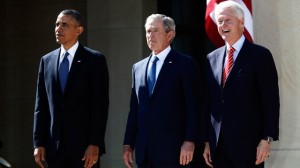
President Barack Obama stands with, from second from left, former Presidents George W. Bush and Bill Clinton at the dedication of the George W. Bush presidential library on the campus of Southern Methodist University in Dallas, Thursday, April 25, 2013. (AP Photo/Charles Dharapak)
If the problem-plagued rollout of healthcare.gov is any indication, 25 years of bipartisan efforts to downsize the federal government and turn a broad swath of what was the public sector over to private contractors haven’t yielded the awesome efficiencies the “reinventing government” crowd promised us. What a shocker.
Slate’s David Auerbach dug into the team tasked with delivering this admittedly complex website, and found an impenetrable web of contractors and subcontractors, some with more political connections than experience to recommend them, working on the project with poor coordination and oversight.
Michael Slaby, the Obama reelection campaign’s tech guru, told Andrew Romano of The Daily Beast that federal procurement “rules all favor incumbents.
The people who get the job are not necessarily the people who are good at delivering a website. They’re mostly just government contractors who are really, really good at the system. Then they subcontract, and that makes the process even more complicated. It’s very hard to build technology by committee.”
And as the problems with the system became apparent, we just shovelled more and more dollars at these same contractors, according to Reuters.
Our never-ending debates about the size of government have always been rather silly when you consider that in the end, quality is always more important than quantity. Good governance is so much more important than some arbitrary, ideologically informed notion of the government being too big or too small.
And the belief — common among conservatives — that the size of government is growing at a breakneck pace is almost laughable. In 2012, there were 355,000 fewer civilian workers in the federal government than there were in Ronald Reagan’s final year in office (and 800,000 fewer total personnel when you include the uniformed military). That’s despite 25 years of economic growth and the addition of several new programs.
It’s no accident – we’ve been shrinking down the government and outsourcing as many of its functions as we could for a generation now. The Clinton administration’s “Reinventing Government” initiative – which took place in two phases, known as REGO I and II – resulted in a whopping 17 percent reduction in the federal workforce. The effort conformed to a central belief of Clinton’s New Democrats: that old-school liberals had become too enamored with public programs, and harnessing the power of the “free market” would allow them to deliver better public services at a lower cost.
The initiative resulted in some innovations, like government data being made readily available over the Internet. But 20 years later, Donald Kettl, dean of the School of Public Policy at the University of Maryland, told Government Executive, an industry magazine, that it also caused some serious problems. “The reduction didn’t happen in a way that matched workforce needs because they used a strategy for downsizing to hit a target,” he said. “The effort got in the way of the ‘making government work better’ piece. Many with special skills left, and people who stayed might have been those we’d have wanted to leave.”
And here’s the kicker: According to a 1999 study of defense contracting by the Project on Government Oversight (PoGo), even as we were outsourcing a ton of work to the private sector, the agencies that had been “successful at reining in industry fraud” were those hit hardest by the cuts, including a 19 percent cut in staff at the Defense Contract Audit Agency, which had saved “almost $10 for each dollar invested,” and a 21 percent cut in the Department of Defense Inspector General’s office.
When George Bush came into office, his team wasn’t interested in most of Clinton’s “reinventing government” reforms. The exception was outsourcing. Paul Light, a professor of public policy at New York University, told Government Executive that the new administration hated bureaucracy, and championed “procurement reform,” stripping away more layers of oversight in order to further “streamline” the contracting process.
PoGo executive director Danielle Brian wrote in 2007 that all these “changes to procurement law so undermined taxpayer protections that, as many IG inspections are revealing, the contracting system is now rife with waste and abuse. The system lacks real transparency and accountability, and freezes out many smaller firms through extraordinarily weak competition requirements. And some contracting practices, once considered to be unlawful, are now business as usual.”
(Whatever the impact all this outsourcing has had on the delivery of public services, there’s no question it was an effective union-busting technique. That’s just basic math: we’ve moved hundreds of thousands of jobs out of the public sector, with its 36 percent rate of union membership, to the private sector, where only 6.6 percent of the workforce belongs to a union.)
Nobody can say with any certainty that the rollout of healthcare.gov would have gone smoother absent those two decades of so-called “reforms.” But looking at the oversight problems and the tangled web of contractors and subcontractors that had their hand in the process, it’s certainly fair to say that “reinventing government” by gutting it doesn’t appear to have lived up to its promise.


